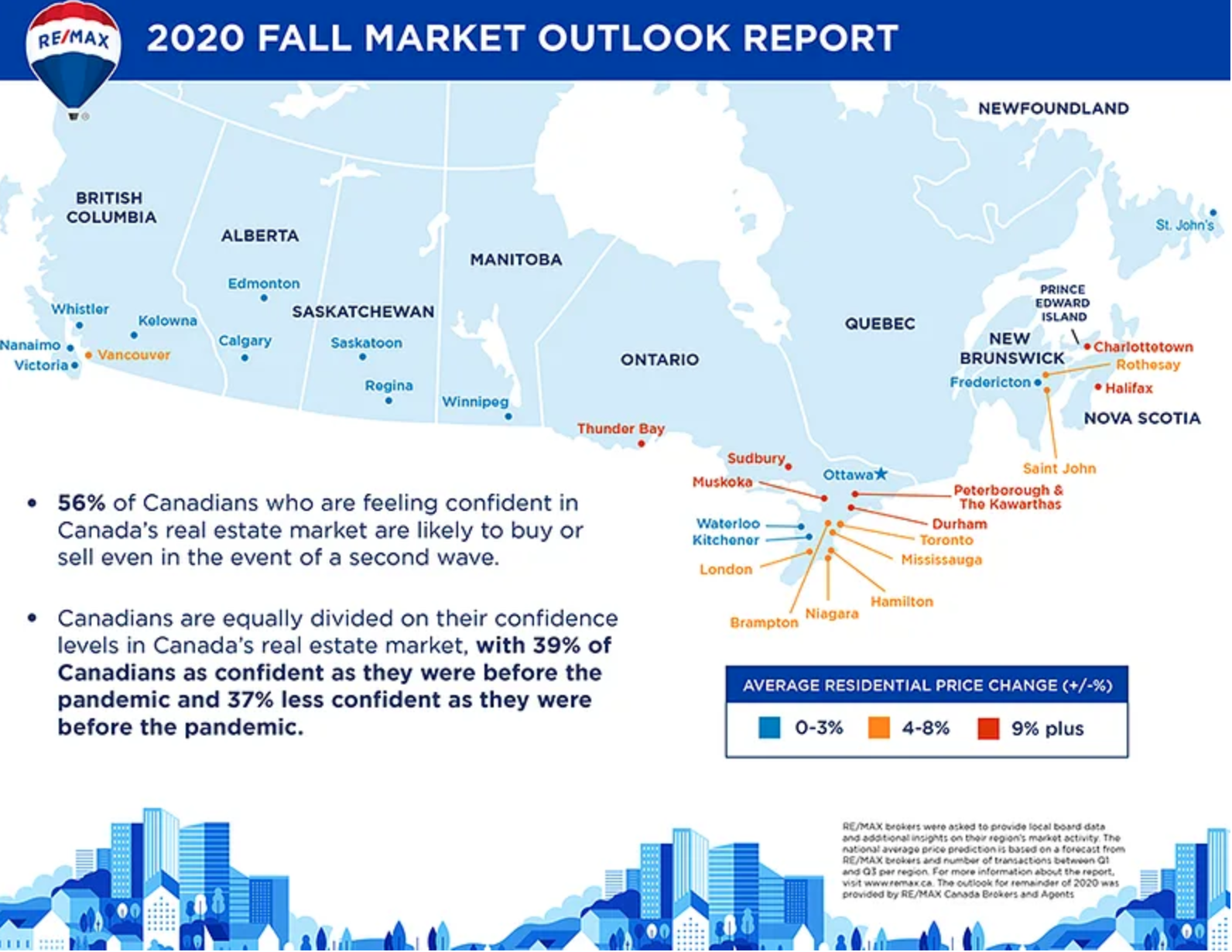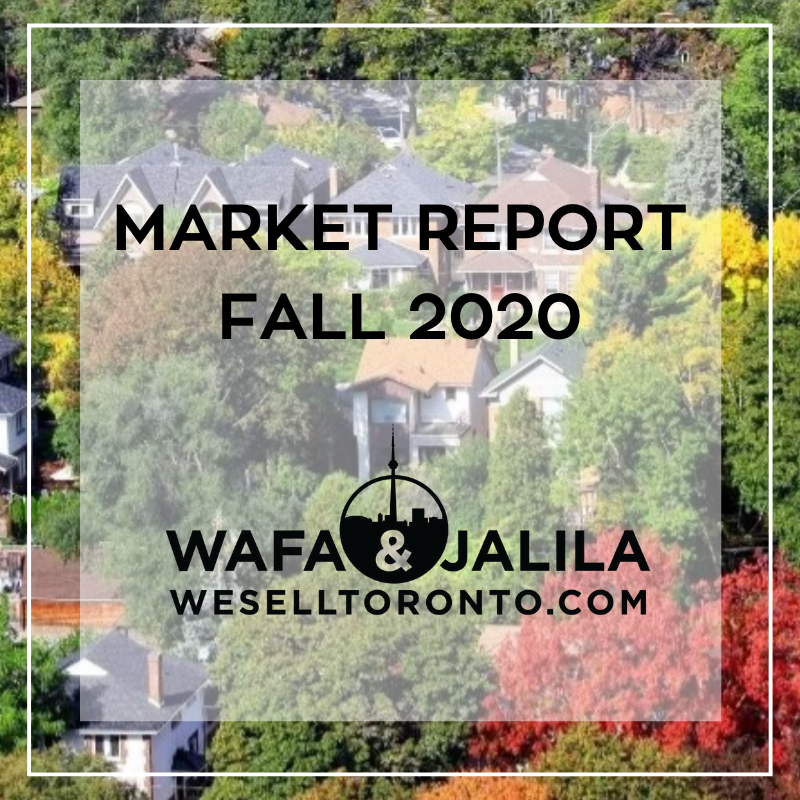Canadian housing market expected to remain active for the remainder of 2020 due to pent-up demand and low inventory levels, say RE/MAX brokers and agents
Canadians showing more interest in suburban and rural homes for sale, as work and life dynamics shift
- Canadian housing prices anticipated to increase by 4.6% in the third and fourth quarter according to RE/MAX brokers and agents. This is compared to the earlier prediction by RE/MAX brokers and agents of +3.7% at the start of the year.
- 32% of Canadians no longer want to live in urban centres, opting for rural or suburban communities instead.
- Canadians are almost equally split in their confidence in Canadian housing market, with 39% as confident as they were before the pandemic, and 37% slightly less confident.
Leading indicators from RE/MAX brokers and agents across the Canadian housing market point to a strong market for the remainder of 2020. According to the RE/MAX Fall Market Outlook Report, RE/MAX brokers suggest that the average residential sale price in Canada could increase by 4.6 per cent during the remainder of the year. This is compared to the 3.7 per cent increase that was predicted in late 2019.
The pandemic has prompted many Canadians to reassess their living situations. According to a survey conducted by Leger on behalf of RE/MAX Canada, 32 per cent of Canadians no longer want to live in large urban centres, and instead would opt for rural or suburban communities. This trend is stronger among Canadians under the age of 55 than those in the 55+ age group.
Not only are Canadians more motivated to leave cities, but changes in work and life dynamics have also shifted their needs and wants for their homes. According to the survey, 44 per cent of Canadians would like a home with more space for personal amenities, such as a pool, balcony or a large yard.
Looking ahead at the Canadian housing market
RE/MAX brokers across Canada were asked to provide an analysis on market activity during COVID-19 lockdowns, assessing how their regions have bounced back with easing restrictions. They also provided a prediction of market activity for the remainder of 2020. Unsurprisingly, most provinces experienced a slowdown in March and April, with significant drops in activity up to 70 per cent year-over-year. Prices, however, have remained stable across the country. Heading into fall, 50 per cent of RE/MAX brokers and agents surveyed anticipate a modest increase in average residential sale prices.
.
Western Canada Housing Market
While COVID-19 lockdowns in March and April slowed down the housing market in Western Canada, transactions in Kelowna, Saskatoon and Vancouver resumed by May, with sales in both May and June surpassing year-over-year levels. Many buyers put their plans on hold at the peak of COVID-19 lockdowns, but they returned to the market quickly to make up for lost time. Edmonton’s housing market quickly bounced back to pre-COVID levels in June, while Saskatoon experienced its busiest June in years; this momentum is anticipated to continue into the fall market, with RE/MAX brokers and agents estimating a three-per-cent increase in average residential sale prices for the remainder of the year. Overall, brokers and agents in Western Canada say the potential buyers they are talking to are not too concerned with a potential second wave of COVID-19 impacting their real estate journey, and RE/MAX brokers are estimating steady activity to round out 2020.
Regional housing market insights:
Victoria, BC
Nanaimo, BC
Vancouver, BC
Whistler, BC
Kelowna, BC
Edmonton, AB
Calgary, AB
Saskatoon, SK
Regina, SK
Winnipeg, MB
Ontario Housing Market
With Ontario being one of the hardest-hit provinces in Canada, markets like Niagara, Mississauga and Kitchener-Waterloo experienced significant drops in activity, but bounced back aggressively in June as economies began reopening. Toronto continues to be a sellers’ market with low listing inventory and high demand. An uptick in new listings is anticipated for the fall market, now that buyers and sellers are more comfortable engaging in the housing market, with all of Ontario now in phase three of re-opening. RE/MAX brokers estimate a five-per-cent increase in average residential sale price in Toronto for the remainder of the year. According to the RE/MAX broker network in Ontario, market activity in the province is estimated to remain steady in the fall, with the potential for modest price increases of up to six per cent in regions like Hamilton, Brampton and London.
Regional housing market insights:
London, Ont.
Niagara Region, Ont.
Kitchener-Waterloo, Ont.
Hamilton-Burlington, Ont.
Mississauga, Ont.
Toronto, Ont.
Brampton, Ont.
Sudbury, Ont.
Thunder Bay, Ont.
Durham Region, Ont.
Ottawa, Ont.
Atlantic Canada Housing Market
Regions with low case counts of COVID-19, such as Halifax, Charlottetown and Saint John experienced slower activity in March, but the decline was less pronounced than that of some Ontario and Western Canada markets. Halifax continues to experience a shortage in listing inventory since before COVID-19, and the shortage has caused an uptick in average residential sale price. RE/MAX brokers anticipate a 10-per-cent increase in average residential sale price in Halifax for the remainder of the year. Activity in Atlantic Canada was back to pre-COVID-19 levels by May 2020, and like many sellers’ markets in Canada, multiple offer scenarios continue to happen in these regions.
Regional housing market insights:
Saint John, NB
Halifax, NS
Charlottetown, PEI
St. John’s, Newfoundland

Pent-up demand causing sellers’ market-like conditions in recreational markets
When it comes to recreational property markets in Canada, the regions surveyed for the report experienced a slight decrease in sales activity in March, similar to most major cities in Canada; however, similar to other markets, this picked up quickly by May. Muskoka, Peterborough and the Kawarthas, and Whistler are all experiencing sellers’ market conditions, with pent-up demand and low inventory driving a modest increase in pricing. According to RE/MAX brokers, average prices in these recreational markets are estimated to remain stable for the remainder of 2020.
In lockstep with the Leger survey revealing increased consumer interest in relocating to rural areas, as well as 48 per cent of Canadians wanting to living closer to green space, RE/MAX brokers and agents have reported that many buyers in Toronto and Vancouver, who are now working remotely, have expressed interest in regions like Muskoka and Peterborough and the Kawarthas, and Whistler, in search of more space and access to nature.
Canada’s luxury real estate continues to thrive
While the classification of “luxury homes” is specific to each region and differs across the country by minimum pricing, Canada’s overall luxury market has remained strong throughout the pandemic, with market conditions unchanged from the beginning of the year in most regions.
When it comes to the hottest Canadian housing markets of Toronto and Vancouver, the luxury segment here is considered balanced, with Vancouver pushing into a sellers’ market. Vancouver is beginning to see more interest from move-up buyers instead of the foreign buyers who drove demand in Vancouver’s luxury market prior to COVID-19. This was likely due to travel restrictions brought on by the pandemic. In Toronto, activity was slower than usual this spring as buyers did not have any urgency to transact during the pandemic. Both luxury markets are could likely remain balanced for the remainder of the year, according to RE/MAX luxury specialists.
The luxury segment in secondary markets such as Hamilton are seeing a slight uptick in activity, with high-end buyers also seeking more square footage and larger properties outside of city centres. Hamilton has experienced an increase in buyer interest from residents from Brampton and Mississauga looking to relocate to the region.
Survey respondents split on their confidence in the Canadian housing market
The survey found that Canadians are almost equally split in their confidence in Canada’s real estate market, with 39 per cent as confident as they were prior to the pandemic, and 37 per cent slightly less confident. When it comes to the prospect of a second wave of COVID-19, 56 per cent of Canadians who are feeling confident in Canada’s real estate market are still likely to buy or sell.
In re-contacting the respondents who lost confidence about their local housing market from the RE/MAX Global Outlook Report survey that was conducted in May 2020, asking if their confidence level in their market has changed since the start of the pandemic, 40 per cent are now as confident as they were before the pandemic. This is compared to their responses in May, which found that 58 per cent were less confident in their housing market, alluding to growing optimism in the market as COVID-19 lockdown restrictions continue to ease across the country.
Additional highlights from the 2020 Fall Canadian Market Outlook Report Survey:
- 48 per cent of Canadians would like to live closer to green spaces
- 48 per cent of Canadians say its more important than ever to live in a community close to hospitals and clinics
- 33 per cent of Canadians would like more square footage in their home and have realized they need more space
- 44 per cent of Canadians want a home with more outdoor space and personal amenities (i.e. balcony, pool etc.)
About the 2020 RE/MAX Fall Market Outlook Report
The 2020 RE/MAX Fall Market Outlook Report includes data and insights from RE/MAX brokerages. RE/MAX brokers and agents are surveyed on market activity and local developments. Regional summaries with additional broker insights can be found at REMAX.ca.
Are you curious about the current value of your home? Considering doing renovations or upgrades? Looking to move away from Toronto?
Call us anytime, we are here for all of your real estate needs!
Contact us today: 416-699-9292
info@weselltoronto.com
Post a comment and subscribe to our blog!
https://weselltoronto.com/subscribe
Source: https://blog.remax.ca/


.png)




Post a comment